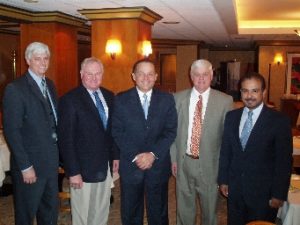
Maritime leaders from port authorities across the United States and Canada converged in Washington, D.C. for the American Association of Port Authorities (AAPA) annual spring conference, held March 19-20, 2007 at the Willard InterContinental Hotel. Speaking at yesterday’s seminar on trade and transportation trends were Panama Canal Authority (ACP) Administrator/CEO Alberto Alemán Zubieta and Global Insight Principal Paul Bingham.
Aside from briefing conference attendees on expansion, Mr. Alemán also shared a synopsis of the ACP’s history, important milestones, key operational metrics, capacity issues and trends that are affecting the global supply chain, such as containerization. Mr. Alemán noted that the industry is moving toward larger (longer and wider) ships (approximately 34 percent of the containers shipped around the world are moved on Post-Panamax vessels), which evidences the important and critical need for a Panama Canal expansion.
“The Canal is expected to handle approximately 320 million Panama Canal tons through the waterway this year. We are rapidly approaching the Canal’s maximum capacity. With expansion in the near horizon, we remain committed to providing our customers with creative solutions to meet their needs in the short term. And, as always, we remain steadfast in continuing to provide a safe, efficient and reliable service,” said ACP Administrator/CEO Alberto Alemán Zubieta.
The AAPA conference included presentations on port management, government relations issues and intermodal freight policies in the Western Hemisphere. Additionally, Kurt Nagle, president and CEO of AAPA, gave opening remarks.
ACP and Corn GrowersApart from the AAPA conference, Mr. Alemán also met with leaders from the National Corn Growers Association, the Illinois Corn Growers Association and the Illinois Corn Marketing Board. The United States is the largest corn producer in the world and corn is the largest export out of Illinois. Moreover, approximately 80 percent of the corn that is exported out of Illinois goes through the Panama Canal. Mr. Alemán briefed leaders from this delegation on how the Panama Canal expansion will benefit their industry, including: increased cargo carrying and draft capacity, increased availability of transit slots, opportunity for more flexibility to take advantage of demand surges and improved transit times.
“Corn is an important commodity shipped through the Panama Canal. It represents nearly 50 percent of the waterway’s grain trade, and around nine percent of total Canal cargo,” said Mr. Alemán. “We are confident that expansion will provide many opportunities and benefits for increased trade of this good.”
In a historic move, Panamanians voted on October 22, 2006 to expand the Canal. Expansion involves building a third lane of traffic along the waterway through the construction of a new set of locks, which will allow more traffic and double Canal capacity. Expansion will tighten the global supply chain and help get goods to market faster, thus saving time and money for both producers and consumers.
About the Panama Canal Authority (ACP)
The ACP is the autonomous agency of the Government of Panama in charge of managing, operating and maintaining the Panama Canal. The operation of the ACP is based on its organic law and the regulations approved by its Board of Directors. For more information, please refer to the ACP’s website: http://www.pancanal.com/.

